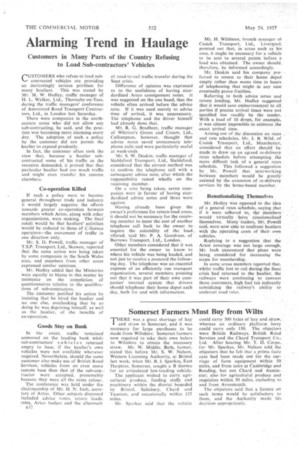Alarming Trend in Haulage
Page 66

If you've noticed an error in this article please click here to report it so we can fix it.
Customers in Many Parts of the Country Refusing to Load Sub-contractors' Vehicles
CUSTOMERS who refuse to load subcontracted vehicles are providing an increasingly serious problem for many hauliers. This was stated by Mr. M. W. Hedley, traffic manager of H. L. Walker, Ltd., Thornahy-on-Tees, during the traffic managers' conference of Associated Road Transport Contractors, Ltd., in London last Saturday.
There were companies in the northeastern areas who did not allow any sub-contracting, he said, and the position was becoming more alarming every day. The adoption of such a policy by the customer did nut permit the haulier to expand prudently.
In fact, the customer often took the view that, because a haulier subcontracted some of his traffic as the occasion demanded, it proved that that particular haulier had too much traffic and might even transfer his custom elsewhere.
Co-operation Killed
If such a policy were to become general throughout trade and industry it would largely negative the efforts towards greater co-operation between members which .Artco, along with other organizations, were making. The final result would be that hauliers' activities would be reduced to those of C-licence operators—the movement of traffic in one direction only.
Mr. S. D. Powell. traffic manager of T.S.P. Transport, Ltd., Skewen, reported that the same action was being taken by some companies in the South Wales area, and members from other areas expressed similar opinions.
, Mr. Hedley added that the Ministries were equally to blame in this matter by insistence on the completion of questionnaires relative to the qualifications of sub-contractors.
The customer justified his action by insisting that he hired the haulier and no one else, overlooking thatby so doing he was depriving himself, as well as the haulier, of the benefits of co-operation.
Goods Stay on Bank
In the event, traffic remained unmoved on the loading bank while sub-contractors' vehicles returned empty to base, if the haulier's own vehicles were not available whenever required. Nevertheless, should the same customer also make use of British Road Services, vehicles from an even more remote base than that of the sub-con-tractor were accepted, presumably because they were all the same colour.
The conference was held under the chairmanship of Mr. H. N. Inch, secretary of Artco. Other subjects discussed included advice notes. return loads. rates, Artco badges and the aftermath B32 of road-to-rail traffic transfer during the Suez crisis.
Difference of opinion was expressed as to the usefulness of having standardized Artco consignment notes. It was suggested on the one hand, that the vehicle often arrived before the advice note. If it was used merely to advise time of arrival, it was unnecessary. The telephone and the driver himself had already done that.
R. G. Bradheer, traffic manager of Whitton's Green and Cream, Ltd., Cullompton, however, thought that advice notes saved unnecessary telephone calls and were particularly useful at week-ends.
Mr. S. W. Deakin, traffic manager of Stableford Transport, Ltd., Stableford, considered that the correct method was to confirm the telephone call with a -subsequent advice note, after which the responsibility rested wholly on the receiving member.
On a vote being taken, seven companies were in favour of having standardized advice notes and three were against.
Having already been given the owner's preference for return-load areas, it should not be necessary for the receiving member to incur the cost of another telephone call back to the owner to inquire the suitability of the load,. offered, said Mr. P. A. Goodrum, of Burrows Transport, Ltd., London.
Other members considered that it was essential for the owner to know to where his vehicle was being loaded, and not just to receive a postcard the following day. The telephone was an essential expense of an efficiently run transport organization, several members pointing out that it was part of their own companies' internal system that drivers should telephone their home depot each day, both for and with information. Mr. H. Wildman, branch manager of Cusick Transport, Ltd., Liverpool, pointed out that, in areas such as his OWES, it might be necessary for a vehicle to be sent to several points before a load was obtained. The owner should. therefore, be informed accordingly.
Mr. Deakin said his company preferred to return to their home depot empty rather than waste time in hours of telephoning that might in any case eventually prove fruitless.
Referring to both advice notes and return loading, Mr, Hedley suggested that it would save embarrassment to all parties if precise arrival times were not specified too readily by the sender. With a load of 10 drops, for example, it was almost impossible to estimate the exact arrival time.
Arising out of the discussion on rates and rate schedules, Mr. J. B. Wild, of Cusick Transport, Ltd., Manchester, considered that an effort should be made to draw up an agreed re-delivery rates schedule before attempting the more difficult task of a general rates schedule. This followed, a suggestion by Mr. Powell that interworking hetiveen members would be greatlyassisted by the extension of re-delivery services by the home-based member.
Renationalizing Themselves
Mr. Halley was opposed to the idea of a general rates schedule, saying that if it wereadhered to, the members would virtually have renationalized themselves. Many traders, Mr. Powell said, were now able to confront hauliers with the operating costs of their own vehicles.
Replying to a suggestion that the Artco coverage was not large enough, Mr. Inch announced that plans were being considered for increasing the scope for membership.
In some areas members reported that, whilst traffic lost to rail during the Suez crisis had returned to the haulier, the railways were continuing to canvass those customers, high fuel tait indirectly subsidizing the railway's ability to undercut road rates.








































































































































